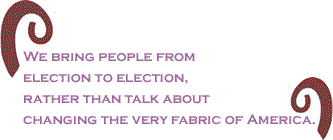
The
following interview with Rev. Al Sharpton took place at
the presidential candidate’s New York City offices.
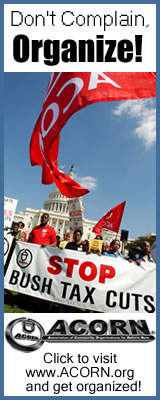 Playboy:
Almost every press report says you are not taken seriously as
a presidential candidate. Why? Playboy:
Almost every press report says you are not taken seriously as
a presidential candidate. Why?
Al Sharpton: I think that is the media. Most polls have me in the middle. The
guys behind me take me seriously, and the guys ahead of me take me seriously
because we are gaining momentum. And if I do a sizeable vote, which I certainly
will, they are going to have to deal with that. I think it's wishful thinking
on the part of some of the mainstream media. I think they are being dismissive
of people on the left in general, particularly people of color. The good news
is that because they do that, they are going to wake up shocked when I come
in with the vote. I bet a lot of pollsters are going to lose their jobs when
we get finished with these primaries.
PB: If you could look into the future and see that your role in this election
was going to mean George Bush would keep the White House, would you drop out
right now?
AS: If I felt that, yes. But I don't feel that. I feel the opposite. I think
that unless someone can galvanize the kinds of people I can galvanize then
we are going to have a repeat of 2002, 2000, 1998. The swing vote is not conservative
white males. The swing vote is in the young voters in the hip-hop generation
and those older voters who have become disaffected and disillusioned. And I
am the candidate that can most galvanize and attract those voters.
PB: Major aspects of your platform are based on passing constitutional
amendments – the
right to a public education of equal high quality, the right to health care
of equal high quality and the ERA. Aren't constitutional amendments a drastic
and ultimately doomed approach?
AS: If you look at the right wing, they have used constitutional arguments
to energize their base – the right to bear arms, prayer in schools. In the
progressive political community we have not talked about permanent change.
As I have campaigned around the country and particularly in the South, people
become energized for permanent change. I think candidates, particularly in
the Democratic Party and on the left, are too shortsighted. We bring people
from election to election, rather than talk about changing the very fabric
of America. The right appeals to people who want to see the fabric of the country
changed. I happen to disagree with their social change, but I think as an organizing
technique, they have been far superior to the progressives and the left side
of the political spectrum. I am not willing to concede the Bible and the flag
to the right. I think that at some point we did and it was a grave error. At
one of the first forums we had as candidates, some right-to-lifers were marching
and a young lady said to me, I am not only disappointed in you for crossing
our picket line and being pro-choice because you are a candidate, I am disappointed
in you as a minister. And I told her, It is time for the Christian right to
meet the right Christians.
PB: One of your main reasons for running deals with the continued need for
affirmative action. What do you say to whites who believe blacks have gotten
preferential treatment long enough?
AS: It's important because we have not achieved an even playing field. And
if the commitment of the nation is to repair damage done, then you do it until
it is repaired. You don't do it for a time cycle and then say, okay time's
up. One of the things I argue with critics of affirmative action is that you
can't say government should not be involved in repairing damage when government
was involved in doing damage. We're not talking about government correcting
something government didn't do. Blacks were not discriminated against out of
cultural habit. This was law. It was against the law for us to go to certain
institutions. It was against the law for us to have certain jobs. So government
must undo what government did. Isn't it interesting that these same right-wingers
feel we have to repair Iraq and other places where we have done damage? So
we have an obligation to repair our enemies, but we don't have an obligation
to our citizens who built the country?
PB: What is your take on the rumor that Carol Moseley Braun is in the race
to dilute your chances?
AS: I talked to Miss Braun several times last year, and she was talking about
running for her senate seat in Illinois. Then I heard through the media that
she was running for president. So I don't know what motivated her. We'll see
what happens. She certainly has a right to run, but so far, according to most
polls, I am favored by a majority of black voters. So if that was the strategy,
it doesn't seem to be taken well.
PB: Would Jesse Jackson have made a good president?
AS: I think so. I supported him in 1984 and 1988 and worked in the campaigns.
And I think a lot of his ideas ended up influencing the party.
PB: Such as?
AS: Jackson made South Africa a mainstream issue in this country. I remember
in 1984 when he went into the debates, people were saying the [African National
Congress] was a terrorist organization. Jackson made America shift views on
that. [He also] was able to empower a lot of people who would not have held
office. I don't think Doug Wilder would have been governor of Virginia hadn't
Jesse run. Ron Brown certainly wouldn't have been the chair of the party hadn't
Jesse run. Also, a lot of the votes in the South that Bill Clinton used to
win in 1992, Jesse registered in the 1980s.
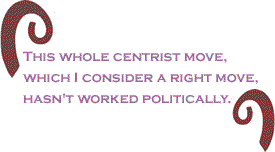
PB: Let's say you don't get the nomination. What kind of impact
do you want to have on the party?
AS: I want to influence the direction of the party. I think
the party has moved far to the right. I think that is why
we have not been effective.
This whole
centrist move, which I consider a right move, hasn't worked politically.
Centrists
keep saying we can't win without going to the center. Well, they have been
in charge of the party since 1992. It's 11 years later and we have lost
everything. We lost the House in 1994 with Gingrich, and
we failed to regain it in 1996,
1998, 2000 and 2002. How do you lose five Super Bowls and not say there
is something wrong with this coach and this game plan? Aside
from the fact that
I don't believe in what they are saying – pro death penalty, pro business,
deregulation, pro NAFTA – politically it hasn't even worked. They act as
though they are outsiders shooting at the inside. They are the insiders.
They have
control of the party, and they have failed. They have put this party on
its deathbed.
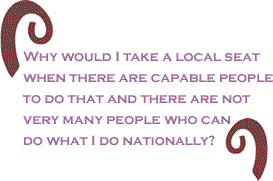
PB: Wouldn't you be able to help the party more effectively
by winning a seat in Congress, which many people think you
can?
AS: I think people ought to serve at the level they feel
they can serve. I can serve nationally. Being in Congress
I couldn't affect
what I
am affecting nationally. For example, I have been able to handle
racial profiling cases
all over this country. Vieques – I couldn't have done any of this as
a congressman. I certainly couldn't have stood with gay and lesbian
rights
nationally. So
you can't fight a national fight and generate a national movement from
a local seat. Also, if people are honest, there are only three or four
nationally known
black political figures anyway. I happen to be one of them. So why
would I take a local seat when there are capable people to do that
and there
are not
very many people who can do what I do nationally?
PB: Name five African Americans, other than yourself, who could be
president today.
AS: Rev. Jackson. I would say [Clinton advisor] Vernon Jordan could
be president. I would say [Clinton labor secretary] Alexis Herman
could
be president. I would
say [San Francisco Mayor] Willie Brown could be president. Also [California
Rep.] Maxine Waters and probably [New York Rep.] Charlie Rangel.
PB: Would you be a more viable candidate had the Tawana Brawley affair
never happened?
AS: No. I think that anyone with my politics and profile, if they
didn't raise Brawley, they would raise something else. When you compare
some
of the personal
issues that they raised on a guy like Clinton, the fact that I stood
up for a young lady for justice, who I believed in, pales in comparison
to some
of that stuff.
PB: Are you offended that Bill Clinton is called "America's first black
president"?
AS: In humor it's fine. But when we start acting like or inferring
that we should be happy that we already had a president that related
to blacks,
that's
insulting. If the issue is black inclusion and empowerment, you can't
use Bill Clinton as an answer. If the issue is that he was comfortable
among blacks,
fine. But I remember the night before the governor's race in New York
in
2002, all of us were onstage at the Bethel AME Church in Harlem – Clinton, his wife,
Rangel, all of us. And I said, "Senator Clinton, I want to correct
one thing. They keep saying your husband was the first black president.
I intend
to be the first black president. Your husband was the first beige president.
There is a difference in being off-white and being black."
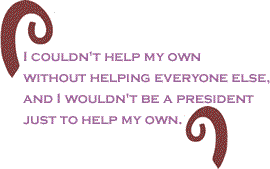
PB: If you were elected president, how would the lives of white
Americans change?
AS: Drastically and for the better. One, they would have a president
that would fight to give guaranteed health care to all Americans.
That is not a race problem.
It may be more of a problem in places of color, but it is a problem
for all Americans. Second, I would not bring us into war in any
dangerous
way, unless
our lives were directly threatened and there was no alternative.
Third, I would fight for public education. There are many poor
whites who
I have
met in Pennsylvania,
Virginia and in the South who need the restoration and maintenance
of public education as much as people who are closer to my background.
It's something
Rev. Jackson used to say: When the boats at the bottom are lifted,
it
lifts all boats. I couldn't help my own without helping everyone
else, and I wouldn't
be a president just to help my own. I would be a president for everyone.
PB: You recently said, "You have a party of elephants with donkey overcoats.
There needs to be a progressive wing of the party." So, why
even be a Democrat in this day and age?
AS: I think the party is going to have to answer that. If we
generate the kind of votes and excitement [that I think we
will], when we
get to Boston,
the
party is going to have to decide its direction. This is a classic
showdown of the direction of a political party in the United
States. Joe Lieberman
represents one wing of the party, and I think I represent another.
I think Kerry and Dean
are somewhere in the middle. It's something the party is going
to have to answer – whether
people should continue to believe this party is open to the ideas
of progressive people.
PB: You are opposed to the war in Iraq. Why?
AS: I have said from the beginning I did not believe we were
in imminent danger. I did not believe there were weapons of mass
destruction.
I think now it is
clear there were not. Imminent means immediate. How do you get out
of a war and four months later say we are still looking for the
weapons?
Then how
were they an immediate threat? That is ridiculous. It is very
important that we
understand that this president, in my opinion, lied to the American
people. He not only lied, he distracted us from going after Al
Qaeda and Bin
Laden, who he committed to go after.... I think that it was an
absolute error of
judgment and dishonest what Mr. Bush did.
PB: You are the only anti-death penalty presidential candidate.
Why, and do you own a gun? [BC
Note: Playboy.com is wrong. Rep. Dennis Kucinich not only opposes
the death penalty,
he introduced a bill to abolish it: H. R. 2574.]
AS: I don't own a gun. I never have owned a gun, and I have been a victim of
a stabbing. So I am not soft on people assaulting people, but I think that
it is absolutely wrong for the state to kill people. One, we see too many cases
where the state has been proven wrong. Second, it is unfair in terms of its
dispensation along lines of class and race. And third, I think that it is embarrassing
to the Democratic Party that a Republican governor in Illinois showed more
moral standing than any Democratic governor by saying, Wait a minute, I am
going to stop this. I absolutely don't understand how someone could call himself
a progressive and be for the death penalty. We have people in the race who
call themselves progressive who support the death penalty. It's almost an oxymoron.
PB: Fast forward to the convention. You have won the nomination. Name five
frontrunners for your vice presidential slot.
AS: [New Mexico Gov.] Bill Richardson. Alexis Herman. Willie Brown. I wish
[Minnesota Sen.] Paul Wellstone was still around. I would look at [Ohio Rep.]
Dennis Kucinich, whose politics I respect. And the fifth one? I would probably
even entertain some discussions with somebody like Bob Graham.
PB: Who is more likely to be assassinated – the first Jewish or the first
black president?
AS: I hope neither, but probably the first black.
PB: Why?
AS: Because our high profile leadership has been historically victimized more
by [violence]. I don't underestimate anti-Semitism at all, but given the historic
record, it would seem that we would be more prone to a violent attack.
PB: Many people said 9/11 was going to break down racial barriers. Have you
seen that?
AS: I think in many ways it did, particularly in the beginning. I saw in New
York a kind of unity and a coming together I never thought I would see. But
I think that Bush et al manipulated it to where it became less than unifying
over a period of time. Those terrorists that attacked the World Trade Center
didn't send an e-mail telling blacks to get out of the building, or Latinos
or Asians. They killed us all as Americans. We all died together. The question
is, can we learn to live together?
PB: What is your take on Schwarzenegger's alleged racist comments?
AS: I am not surprised. Arnold Schwarzenegger is Pete Wilson with biceps. The
irony is that many of the right wingers who say Al Sharpton never held elective
office and therefore shouldn't run for president, want to elect an actor, who
never had a serious thought, as governor. I have been involved in public policy
in the social arena in shaping a lot of this country for the last quarter of
a century. He has been in movies. The difference between Schwarzenegger as
an action man and me as an action man is that the stunt man doesn't do my hard
work. I went to jail and did the marches myself.

PB: Realistically, when do you think we will have the
first black president? Has that person been born yet?
AS: Of course I am going to say that in 2005 Al Sharpton
will be inaugurated. Short of that, I think that yes,
that person has been born. I don't think
you make progress when "the nation is ready." You make progress
when people get ready to make the nation ready. The nation wasn't ready
for blacks
to come to the front of the bus, but Rosa Parks and Martin King were ready.
Some of us are ready to no longer consider the limitations imposed upon
us. And if we are more determined than those we are fighting, our determination
will pay off.
PB: As a former backup singer for James Brown, how would your wife's
influence change the White House and the nation as First Lady?
AS: It would be very soulful and harmonious. She is a great singer and
a great organizer and we would have a lot of fun nights at the White
House. And one
thing America needs is a lot more soul. |































